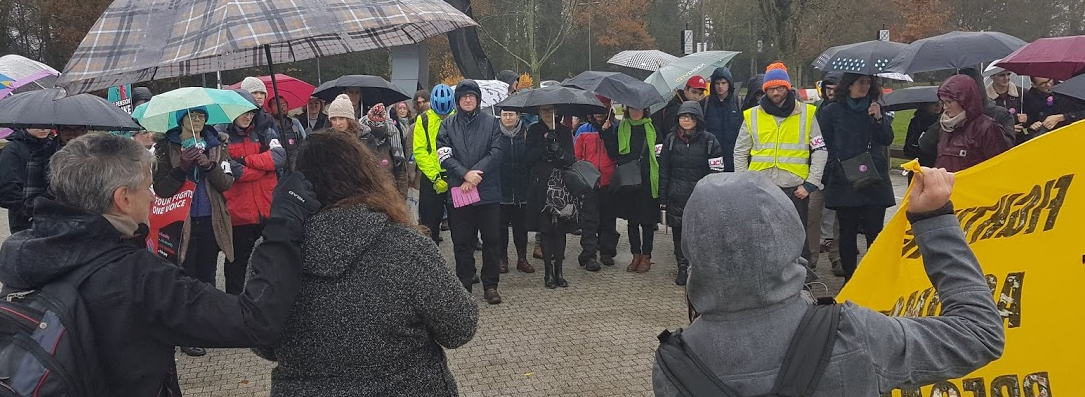This is a new post for the 2022 Industrial Action and subject to minor amendments over the coming weeks.
We ask that, where possible, all members who can should donate to the local solidarity or national fighting fund. Salaried staff who are not in hardship are encouraged to apply to the National fund in the first instance.
Applications to the local solidarity / hardship fund
For the policies and procedures of the fund, see below. If you are on a STP, GTA or VAM contract, please read carefully what evidence to provide if claiming for strike action (we know it’s a pain, and for us assessing the claims too!).
For MAB claims, we can pay up to £350 of lost income (and will revisit this amount later in the year if our funds remain strong). For STP/GTA members, please submit as evidence of lost income your MAB declaration stating total hours you undertook MAB (either the email sent to academic.continuity@warwick.ac.uk or a screenshot of the ASOS form), and then your resulting payslip; we will cover the remainder of the marking hours up to £350.
Please see the links at the bottom of this post to make a claim (yes, we are encouraging everyone to read the content of the post first!).
Donations
Warwick UCU has a local hardship – what we refer to as our ‘solidarity’ – fund. The branch has donated funds to this, but we are also seeking donations from members. We are particularly directing this appeal for donations to our members who are either on leave or who are otherwise not expected to be part of the action.
The local solidarity fund is designed to complement the provision from the National Fighting Fund, and where possible to fill in any potential “gaps”. It will prioritise members on hourly paid and other precarious contracts, and support people who would be left financially vulnerable after deductions. The policies and procedures can be found below.
Please direct non-members to this page which asks if they can make a small donation to support their Union colleagues to protect the pension scheme that they are also part of.
Donations can be received by bank transfer or cheque.
For bank transfer the account details are:
UCU Warwick Hardship Fund
60 83 01
20391524
Please quote the reference: “Solidarity Fund”
It would be helpful to also send a remittance advice to treasurer@warwickucu.org.uk confirming the amount and the name of the donor(s) so we can have a record
Or by Cheque
Please make cheques payable to “UCU Warwick” and send to Treasurer, UCU Office, Avon Building WA1.12, University of Warwick, Coventry, CV4 7AL.
Policies and procedures of the hardship fund
Warwick UCU Strike committee has determined the following principles of policies and procedures.
The local hardship fund will prioritise those whose annual incomes will be particularly proportionally affected by taking strike action or participating in MAB, especially STP, GTA, weekly paid colleagues, and those on less than £30k per annum. Applications from those who do not have access to substantial forms of other, non-affected income (e.g. scholarships) will be prioritised.
Claiming for MAB related hardship: When making an application to the fund, salaried colleagues should upload images of payslips with MAB deductions on them. Deductions will be made by the University from Sept 2023 onwards.
Hourly paid colleagues (GTA’s and those on STP contracts) need to provide a copy of the declaration and the payslip which details the deductions.
Claiming for strike related hardship:
Our fund will award strike pay from the 1st day of strike action, up to a cap of £75 per strike day. This will be interpreted to mean that each day where the strike occurs, and where no work has been undertaken, will be treated as a strike day (independent of whether there was formal work scheduled on these days).
These amounts (£75 x number of days of strike participation) are the maximum amounts to which the aforementioned members can apply for; however, there is no guarantee that we will be able to pay those full amounts. That will depend on the amount of claims received and funds available.
Salaried staff earning over £30k per annum and who are not in hardship are encouraged to apply to the National fund in the first instance. If national funds are not available, local fund applications can be made, and these are capped at £50 per day for staff earning over £30k per annum.
We are continuing to raise funds and the hardship fund will concentrate its funding on the first days and weeks of strike action; and we will then support members’ applications to the national fighting fund for the remainder of the strike duration.
There will be no first come first serve handout for payments, but a deadline for claims advertised that will ensure fair treatment, while it will be possible to get urgent treatment.
Please note that hardship payments are disbursed to compensate members for losses they suffer linked to taking official strike action. We cannot make payments in excess of compensating those losses. We will assess appropriate payment amounts as part of the application process.
Make a claim for lost earning due to industrial action and MAB
New for MAB 2023
Apply to the Local Hardship fund using our updated form for MAB: UCU Warwick: Solidarity Fund Form, MAB (2023).
For Autumn Term Strike action
Please use the link below to apply to the Local Hardship fund for industrial action taken in Term 1 of 2022/23.
UCU Warwick: Solidarity Fund Form, Strike Action (2022-23).



